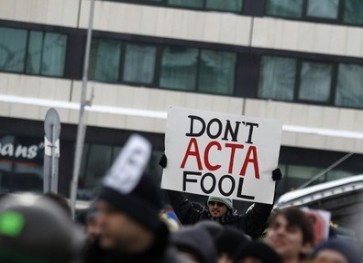ACTA REBELLION
Bulgaria became the fourth European Union member state to halt the ratification of the Anti-Counterfeiting Trade Agreement (ACTA) on February 15, only days after thousands of Bulgarians braved freezing weather to show their opposition to the treaty.
Economy Minister Traicho Traikov announced the decision on February 14, pending Cabinet approval of a motion in that sense, and, in a rare move for Bulgarian domestic politics, said that he assumed the entire blame for Bulgaria signing the treaty on January 26.
"As is traditional in Bulgarian politics, I do not expect anyone to assume the blame, so I can calmly tell you today that I am taking the blame," Traikov told reporters. He said he was prepared to tender his resignation if asked by Prime Minister Boiko Borissov.
Traikov had said earlier that ACTA would not require Bulgaria to amend its existing legislation in terms of policing online infringement of copyrights. On February 14, he said that Bulgarian society made it clear it was not ready to accept mechanisms that raised suspicions of attempted limitation of internet freedom and freedom of speech.
At the same time, he indirectly criticised the entertainment industry lobby, one of the main backers of ACTA (along with pharmaceutical companies), who are suspected of having influenced the treaty's drafting process.
"I am pessimistic on regulation that attempts, through sanctions rather than market methods, to protect an industry that has failed to adapt to the digital age. Never should copyrights be put above human rights," he said.
A day later, during the Cabinet meeting that discussed the motion to suspend ratification of ACTA, Traikov received unconditional support from Borissov, who said that the blame for ACTA's signing should be shared by the previous government, during whose term the negotiations began. Bulgarian institutions had drafted their stance on ACTA in 2007 and 2008, when Traikov "did not even imagine he would ever become a minister," Borissov said.
Domestic fights
Borissov's criticism was directed mainly at socialist leader Sergei Stanishev, his predecessor in office who was recently elected interim president of the Party of European Socialists (PES).
As PES leader, Stanishev has called ACTA "fundamentally flawed in both content and proces" and backed the Europe-wide protests against the treaty on February 11. More than 100 000 people are thought to have participated in rallies in dozens of cities and towns across the EU.
In Sofia, estimates put the numbers at between 4000 and 8000, with smaller rallies held in several other cities and towns.
Stanishev had earlier said that he learned about ACTA from Wikipedia, a claim that Borissov sought to debunk with a lengthy enumeration of the interdepartmental memos drafted during Stanishev's term as prime minister.
"There is no way that Stanishev, as a member of European Council, did not know about [ACTA negotiations]," Borissov said.
In a sideswipe at Meglena Kouneva - Bulgaria's representative in the European Commission in 2007/10, who ran for Bulgarian president in 2011 and is now thought to be preparing her comeback to domestic politics at the 2013 parliamentary elections - Borissov said that Kouneva sat on the European Commission meetings that discussed and approved ACTA negotiations.
"With the risk of angering them, I cannot accept that after years of negotiations Traikov should take the blame, as the headlines of the leading media claim today," Borissov said. "With this motion, we are effectively withdrawing from ratification and I will take the full political responsibility for this move."
European dimension
Borissov and Traikov said that the decision to suspend ratification could leave the Cabinet vulnerable to criticism from its European partners.
Borissov's ruling party GERB is a member of the centre-right European People's Party (EPP) group in European Parliament. The EPP is the main voting bloc backing ACTA, which is opposed by PES, but will not have the support of GERB MEPs when the ratification is put to a vote in European Parliament, expected in June. At the Cabinet meeting, Borissov re-iterated that GERB MEPs will vote against ACTA's ratification.
Should the European Parliament vote against ratification, it would invalidate the EU's participation as a signatory party, releasing EU member states from any obligation to ratify the treaty. Poland, Latvia, the Czech Republic and Bulgaria have suspended ratification, while Cyprus, Estonia, Germany, the Netherlands and Slovakia are yet to sign the treaty.
The Liberal and Democrats group (ALDE), in its first statement on the issue on February 16 said that "the contracting parties so far failed to communicate effectively the added value of this agreement and assuage public concerns as regards some of its provisions."
ALDE group leader Guy Verhofstadt said that the group shared ACTA detractors' concerns about the protection of privacy, access to generic medicines in developing countries and internet freedom, but would work with the European Commission and EU member states to clarify the matters.
The European Commission continues to defend ACTA, saying that its provisions did not require changes in EU law, that the treaty would not limit civil liberties or monitor consumers' online activity. ACTA critics, however, say that the treaty uses very vague language that could be used by signatory parties to justify the implementation of harsher laws.









